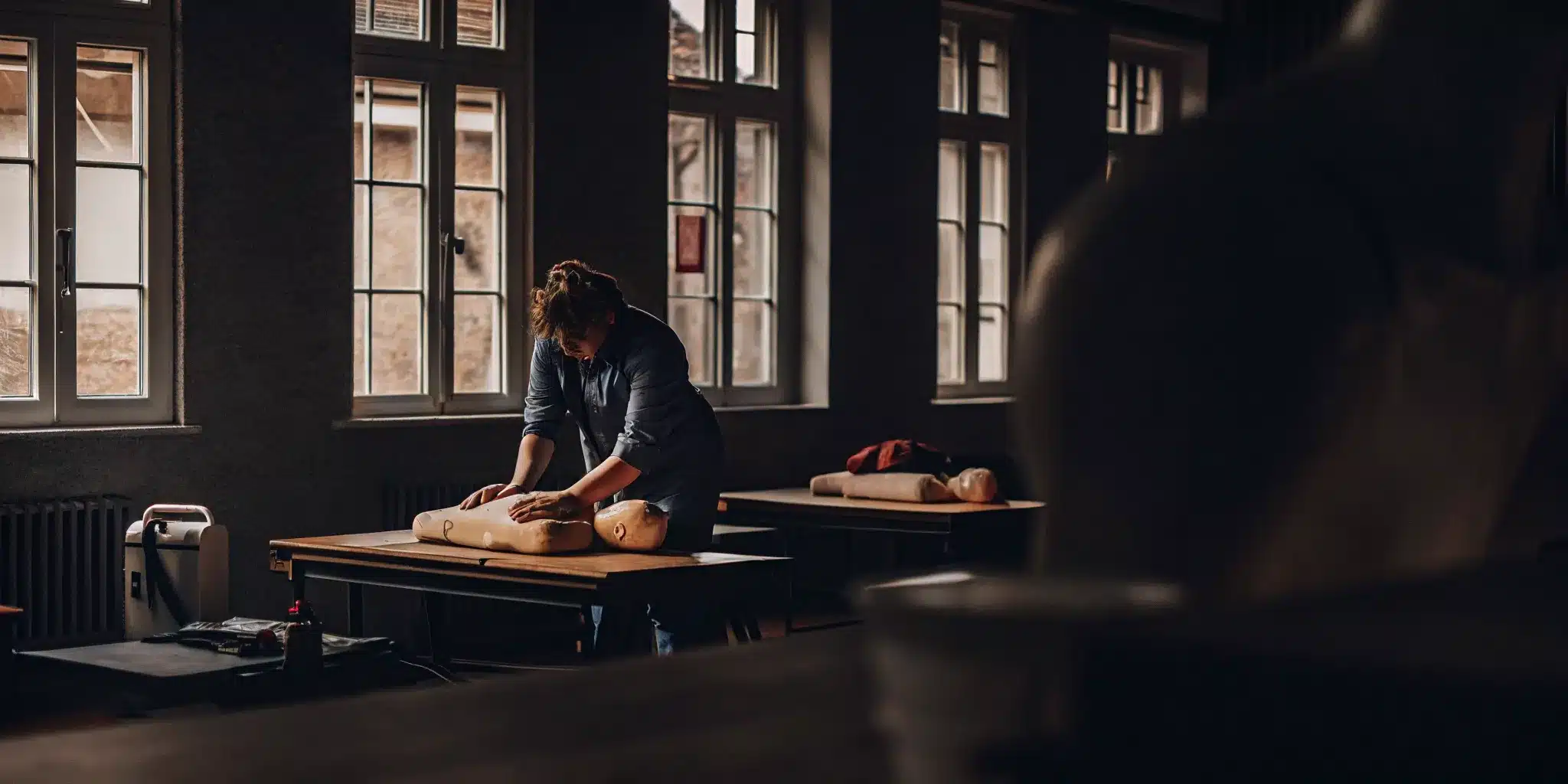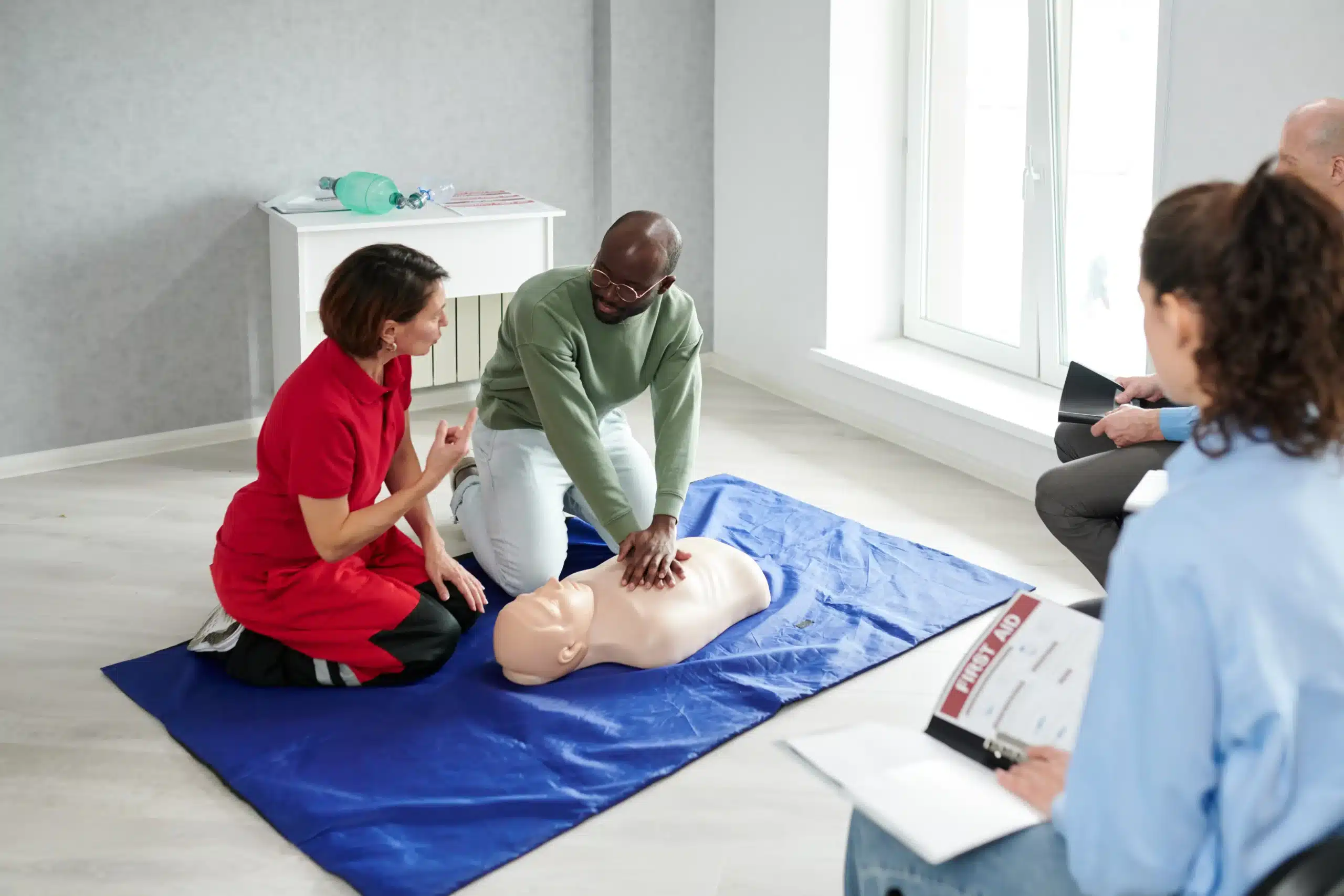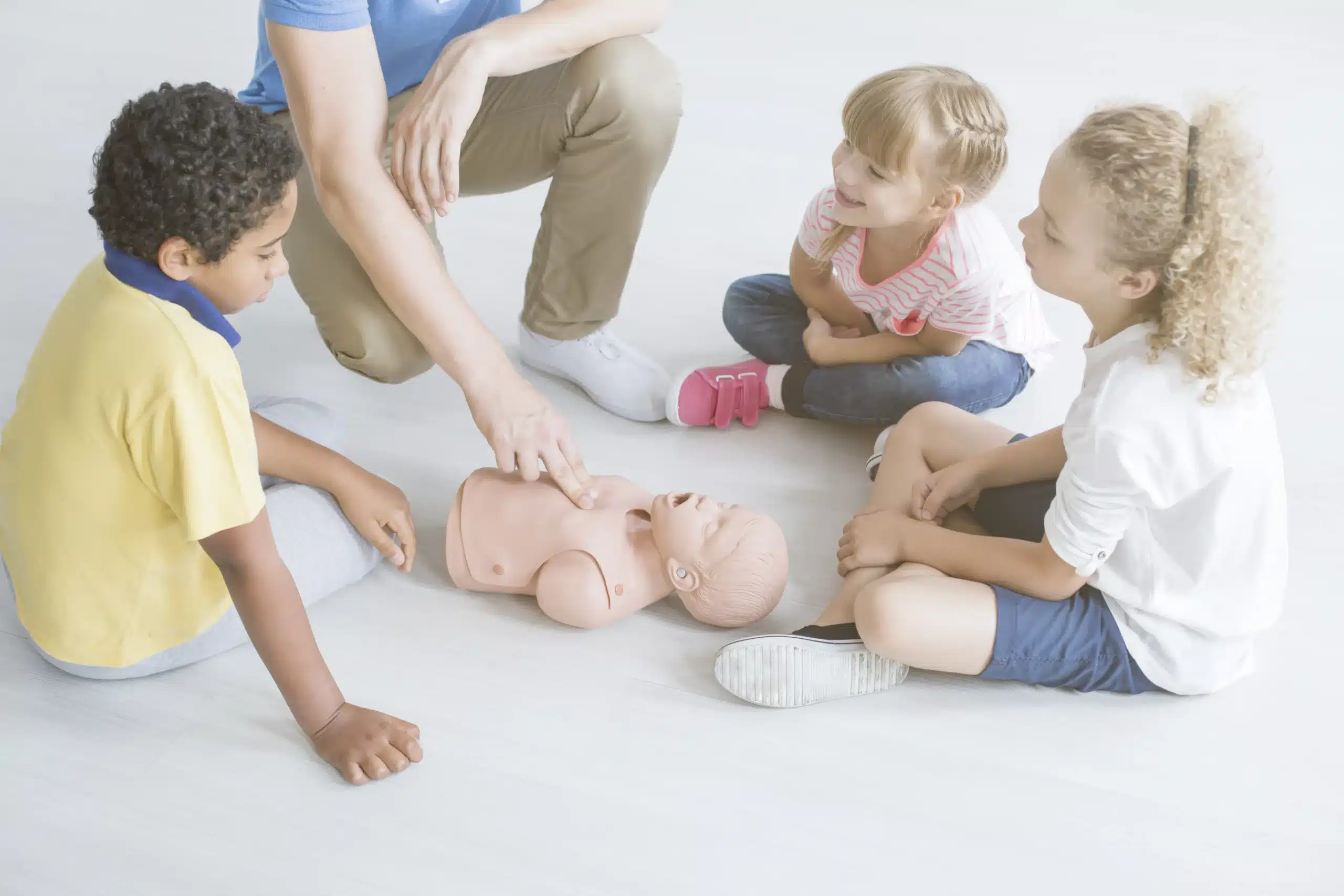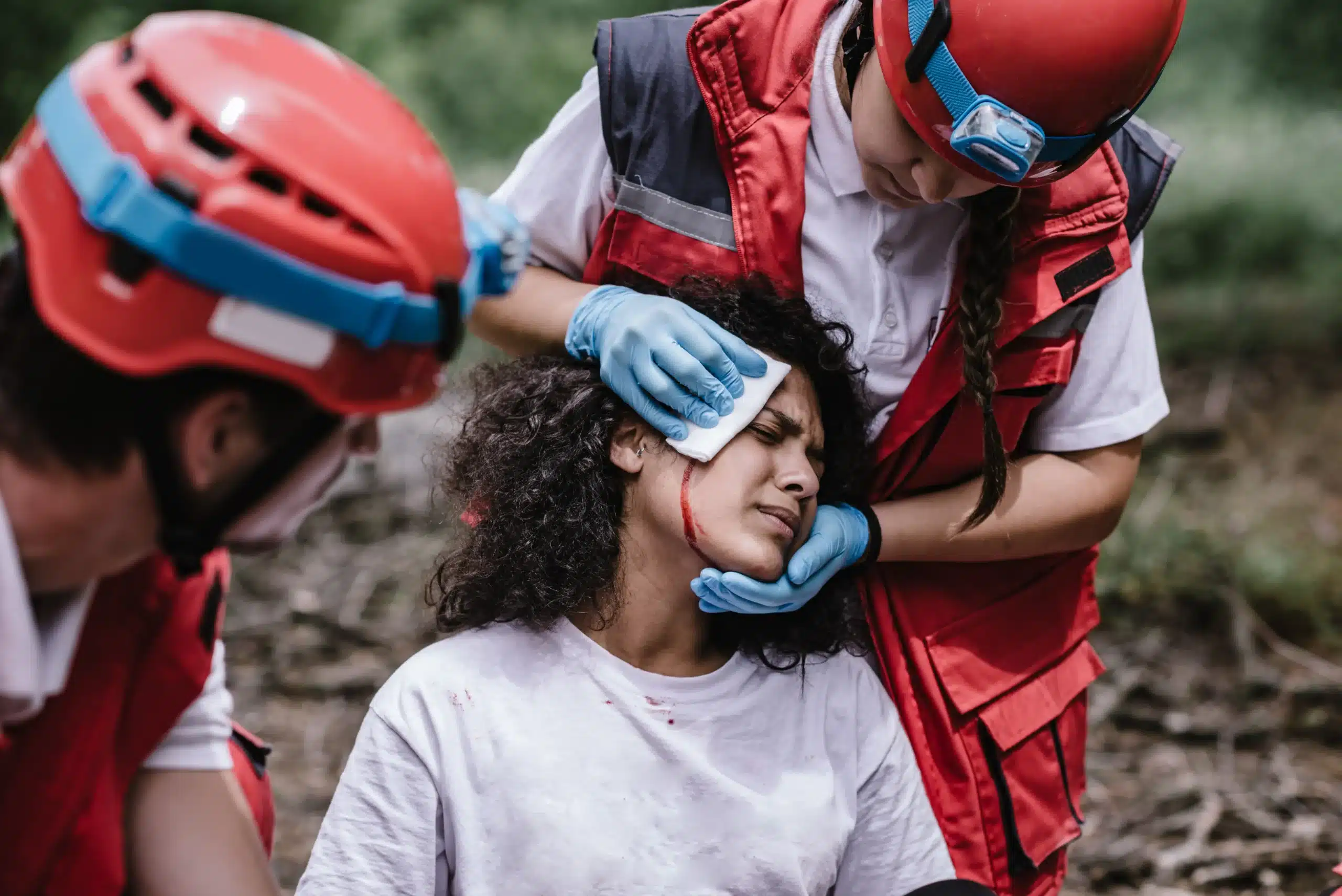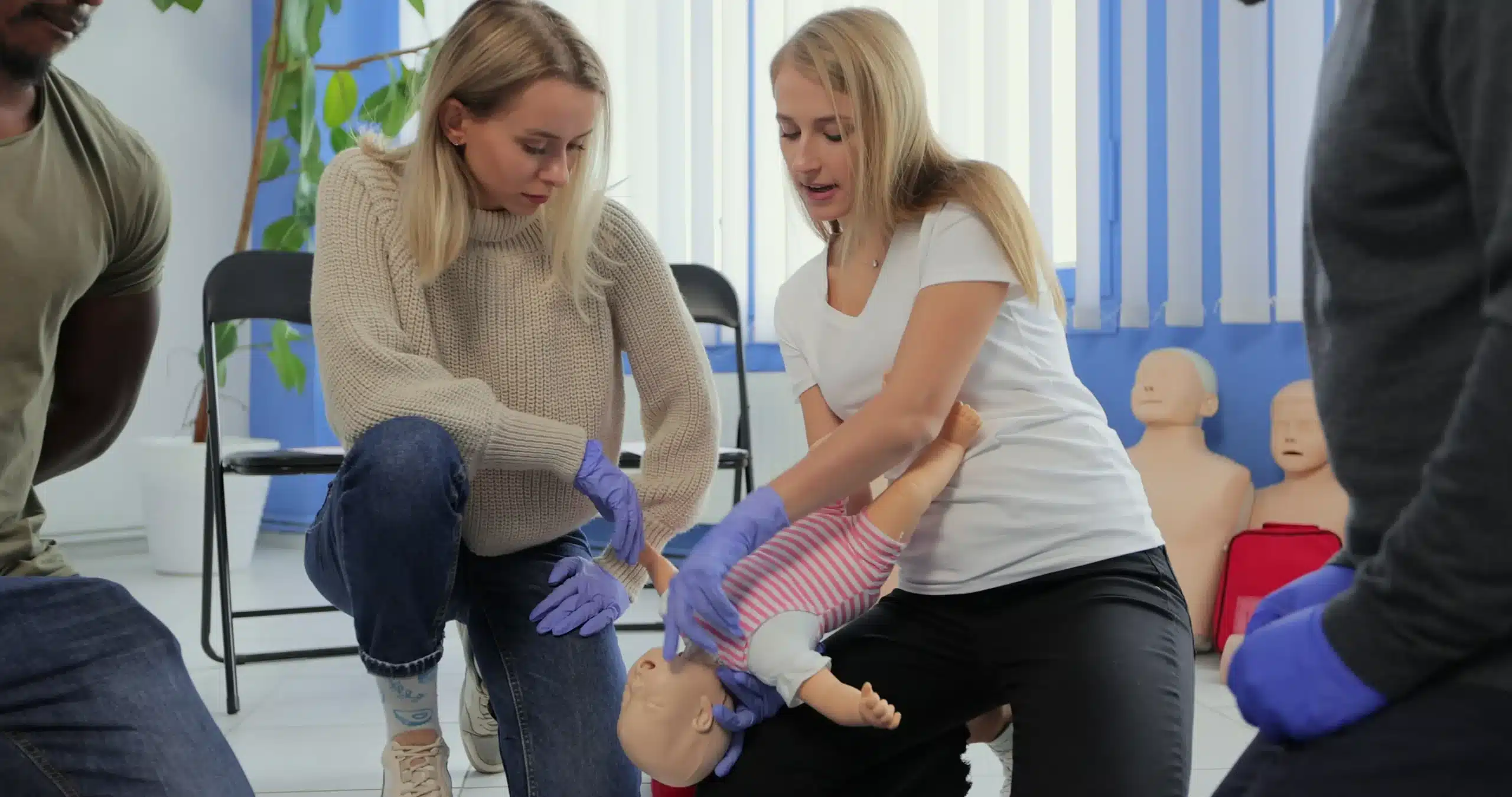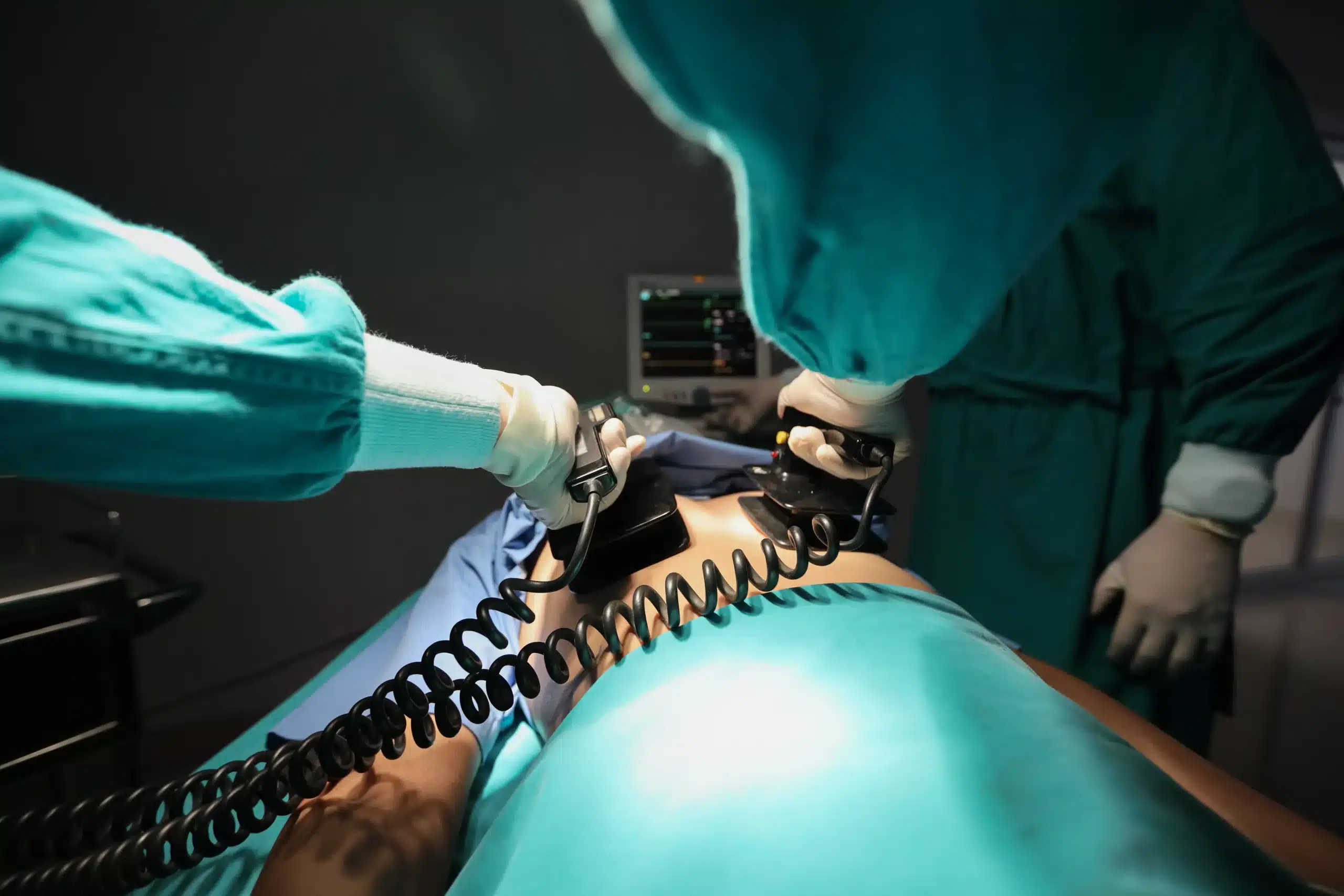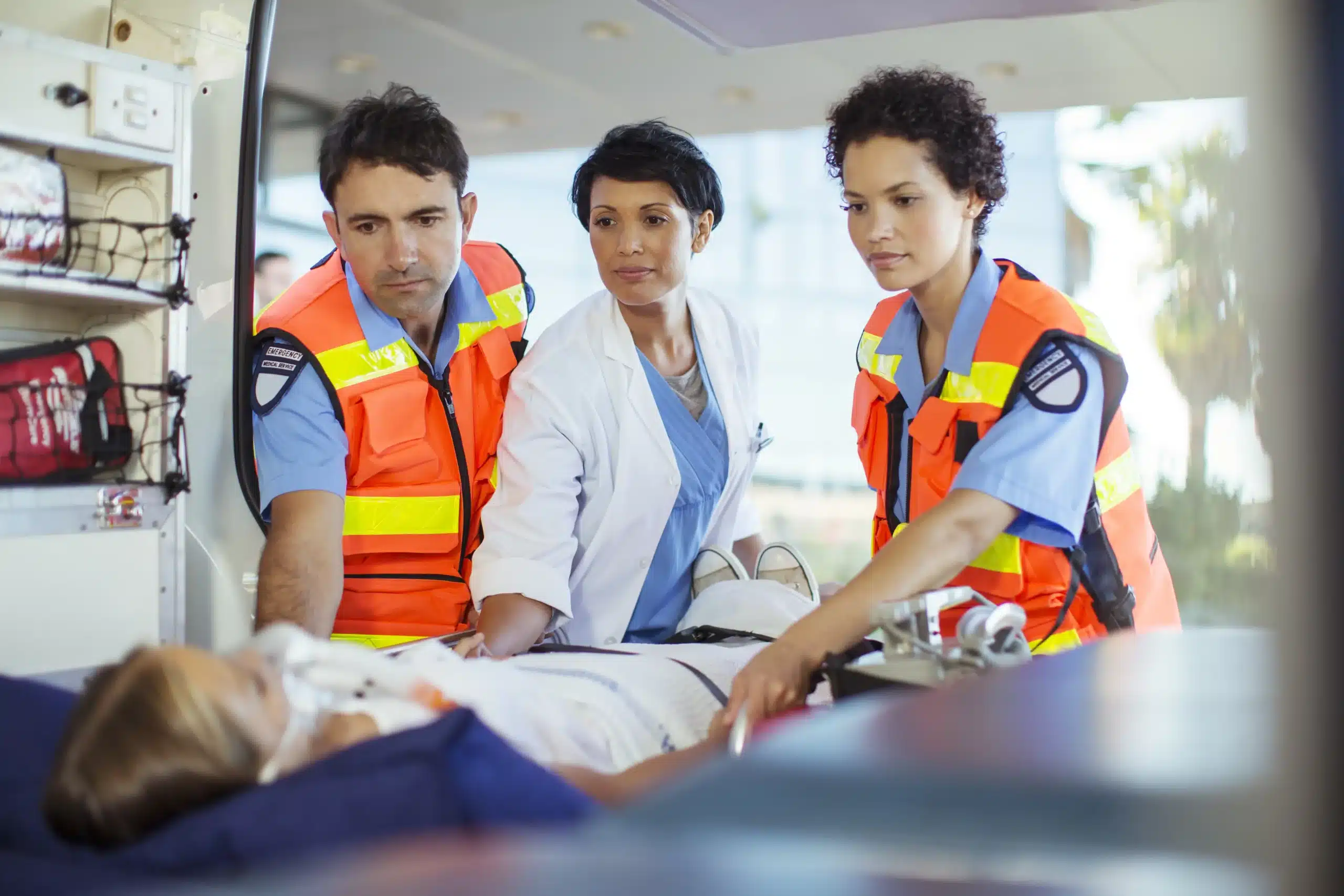Working in healthcare in Mountain House means being prepared for anything. BLS for healthcare providers in Mountain House is your toolkit for handling emergencies effectively. This guide breaks down the essentials of BLS certification, from the core skills taught to the different certification options available in Mountain House, including those offered by Safety Training Seminars. We’ll also discuss how to choose the right course format for your learning style, manage time constraints, and address cost barriers. Plus, we’ll explore how quality BLS training directly impacts patient care and enhances team dynamics in critical situations. Let’s equip you with the knowledge and confidence to provide the best possible care.
Key Takeaways
- BLS certification is crucial for healthcare professionals: It equips you with essential life-saving skills directly linked to improved patient outcomes and fulfills industry requirements. Stay prepared and confident in your abilities through regular training.
- Flexible BLS training options are available to fit your needs: Explore various formats, including in-person classes, blended learning, and on-site group training. Consider factors like location, cost, and schedule to find the best fit.
- Maintaining your BLS skills requires ongoing effort: Stay up-to-date with the latest guidelines through recertification courses and continuing education. Regular practice ensures you’re always ready to respond effectively in emergencies.
What is BLS for Healthcare Providers?
What is BLS and Why is it Important?
Basic Life Support (BLS) is the bedrock of emergency care, providing healthcare professionals with the fundamental skills to save lives. It’s designed for a range of professionals, including nurses, physicians, EMTs, and other healthcare and public safety personnel. BLS equips these individuals with the ability to respond effectively in critical situations. Think of high-quality BLS as the first, crucial link in the chain of survival. When performed according to evidence-based guidelines, it directly correlates with improved patient outcomes. At Safety Training Seminars, we emphasize the importance of immediate and effective BLS in all our courses.
Key Skills Taught in BLS Training
BLS training for healthcare providers covers a comprehensive range of life-saving techniques. You’ll learn how to perform both single- and multiple-responder CPR (cardiopulmonary resuscitation) and how to properly use an AED (automated external defibrillator). The training stresses the importance of quickly recognizing life-threatening emergencies, including the specific needs of infants requiring CPR. Our BLS training at Safety Training Seminars prepares healthcare professionals to confidently handle breathing and cardiac emergencies in adults, children, and infants, ensuring they can respond effectively under pressure. We cover various scenarios and provide ample opportunity for hands-on practice with CPR and AED techniques.
Why is BLS Certification Important for Healthcare Professionals?
As a healthcare provider, you’re on the front lines of patient care. BLS certification equips you with the skills to respond effectively in critical situations. It’s not just a credential—it’s a commitment to providing the highest quality care. Let’s explore why BLS certification is so vital for healthcare professionals in Mountain House, serving the surrounding areas of Dublin and Livermore.
Improve Patient Outcomes
High-quality BLS is crucial for improving patient outcomes. When performed immediately and correctly, BLS can significantly increase the chances of survival. The World Health Organization emphasizes how important immediate and proper basic life support is for positive patient outcomes. It’s the first link in the chain of survival, and your ability to deliver effective BLS can make all the difference. At Safety Training Seminars, we understand the importance of providing comprehensive BLS training that meets these rigorous standards. Our courses equip you with the skills and knowledge to confidently handle various medical emergencies, ultimately contributing to better patient care.
Meet Industry Standards and Regulations
BLS certification is often a requirement for healthcare professionals. Regular training and recertification demonstrate your commitment to maintaining the highest standards of care. Staying updated on the latest techniques and guidelines ensures you’re prepared to handle any emergency situation confidently and competently. It also shows your dedication to providing the best possible care for your patients. Our courses at Safety Training Seminars cover the most current AHA guidelines, ensuring your certification meets industry standards.
Build Confidence and Improve Decision-Making
BLS certification empowers healthcare professionals with advanced life-saving skills specifically tailored to their roles. This specialized training builds confidence and improves decision-making under pressure. BLS for healthcare providers goes beyond basic CPR, equipping you with the knowledge and skills to assess and manage a range of medical emergencies. This enhanced skill set allows you to react quickly and effectively, ultimately leading to better patient care. We offer various BLS course formats at Safety Training Seminars, including in-person classes and blended learning options, to fit your busy schedule and learning preferences.
BLS Certification Options in Mountain House
Finding the right BLS certification course can feel overwhelming, but several excellent options are available in Mountain House and the surrounding areas. Here’s a breakdown to help you find the best fit:
Safety Training Seminars
Safety Training Seminars in nearby Livermore offers a range of American Heart Association courses, including BLS. They’re known for their commitment to excellent customer service and competitive pricing, making them a convenient and affordable choice for those in the Mountain House area. Their certification cards are valid for two years. They also offer group discounts which can be a great option for healthcare teams.
American Red Cross
The American Red Cross provides a widely recognized BLS certification course designed for healthcare providers. They offer both in-person classes and blended learning (online coursework combined with an in-person skills session), giving you flexibility in how you learn. This is a good option if you prefer a nationally known organization.
In-Home CPR
For those seeking training closer to home, In-Home CPR brings the instruction to you. They specialize in on-site training in Mountain House and the surrounding areas. Their courses are taught by experienced medical professionals, including EMTs, RNs, and Paramedics. This is an excellent choice for busy professionals or groups who prefer the convenience of training at their own location.
Local Hospitals and Medical Centers
Many hospitals and medical centers in and around Mountain House offer BLS certification courses. Check with facilities like Sutter Tracy Community Hospital or Stanford Health Care – ValleyCare to see what programs they have available. These courses are often a good option for healthcare professionals looking for training aligned with their workplace’s specific requirements. Contact the individual facilities for more information.
Choose the Right BLS Course Format
Finding the right BLS course format depends on your learning style and schedule. Let’s explore some popular options to help you decide what works best.
Traditional In-Person Classes
Traditional in-person BLS classes offer a structured learning environment with direct interaction with an instructor. This format allows for real-time feedback and provides opportunities to ask questions and practice skills with other students. Organizations like the American Red Cross offer these courses, which are designed to meet various certification and licensing requirements. If you thrive in a hands-on, interactive setting, a traditional in-person class might be the perfect fit.
Blended Learning Approaches
For those seeking more flexibility, blended learning combines online modules with in-person skills sessions. You can work through the online portion at your own pace, then attend a shorter in-person session to demonstrate your skills and receive your certification. This approach is ideal for busy professionals who need to fit training around their existing schedules.
On-Site Training for Healthcare Facilities
If you’re coordinating training for a group of healthcare providers, on-site training can be a convenient and cost-effective option. Companies like In-Home CPR specialize in bringing the BLS course directly to your facility. This eliminates travel time for your team and allows for training tailored to your specific workplace needs. On-site training can also foster team building and improve communication within your team.
Scheduling and Flexibility for Healthcare Professionals
Juggling work, family, and everything else can make finding time for professional development tough. That’s why flexibility is key when it comes to BLS certification. Thankfully, several options cater to busy healthcare professionals in Mountain House.
Weekday and Evening Classes
Finding a time that works with your schedule is easier than ever. Many providers offer BLS certification courses seven days a week, including evenings. This means you can attend a class after your shift or on a less hectic day. This kind of flexibility is a game-changer for healthcare providers who often work long and unpredictable hours. For those in the Livermore, Dublin, and Mountain House areas, Livermore CPR Classes offers a variety of convenient scheduling options.
Weekend Intensive Courses
If you prefer to knock out your BLS training in one go, weekend intensive courses might be a good fit. These focused sessions allow you to earn your certification in a single day, freeing up your weekdays. This format can be especially helpful for those who find it difficult to commit to multiple weekday classes. Check with your local providers or Livermore CPR Classes to see if this accelerated option is available.
Customized Group Training Options
Healthcare facilities in Mountain House can also take advantage of customized group training. This option allows you to train your entire team simultaneously, ensuring everyone is up-to-date on the latest BLS guidelines. Providers like In-Home CPR offer flexible group training with no minimum number of participants and payment due after the class. Plus, the cost per person often decreases with larger groups, making it a budget-friendly choice for facilities looking to train multiple staff members. Livermore CPR Classes also provides discounts for group CPR training.
Cost and Value of BLS Certification
Getting your BLS certification is an investment in your skills and career. But how much does it cost, and what value does it bring? Let’s break it down, specifically for those of you in the Mountain House, Livermore, and Dublin areas.
Average Pricing in Mountain House
BLS certification costs vary depending on the training provider. Around Mountain House, you can expect to pay around $75 for a BLS certification course, which usually covers your course materials. Generally, CPR certification (which can sometimes include BLS training) ranges from $20 to $60, depending on the provider and whether it includes First Aid training. It’s always a good idea to compare prices and what’s included before committing. Check our low price guarantee to see how we compare.
Group Discounts and Special Rates
If you’re coordinating safety training for your workplace and need to train multiple employees, group discounts can make BLS training more affordable. Many training centers, including Safety Training Seminars, offer discounted rates for groups. This can lower the per-person cost, making it easier to equip your entire team with these essential skills. Contact us to learn more about our group discounts.
Invest in Your Career
Think of BLS certification as more than just a cost—it’s an investment in your future. For many healthcare roles, it’s a requirement. A current BLS certification on your resume demonstrates your commitment to patient safety and professional development to potential employers. The skills you gain can make a real difference in emergencies, giving you the confidence to act quickly and effectively. If you’re in healthcare, BLS certification is a worthwhile investment.
Prepare for Your BLS Certification Course
Getting ready for your BLS certification course can make a real difference in how well you absorb the information and build your confidence. Here’s what you can expect, what to bring, and how to prepare:
What to Expect During Training
BLS certification courses are designed specifically for healthcare professionals. The training covers essential skills for responding to medical emergencies in various settings, from hospitals to pre-hospital environments. Expect a combination of interactive lectures, hands-on practice, and realistic simulations. You’ll learn how to assess patients, perform CPR (both single and multiple rescuer), use an AED, and manage airway obstructions. The American Heart Association’s BLS Course provides a good overview of what these courses entail. Many courses, like those offered at Safety Training Seminars, follow these guidelines.
Essential Materials and Equipment
Your BLS course will provide most of the equipment for practice, but it’s helpful to come prepared. A notebook and pen are always good for jotting down notes. You might also want to bring a small bag or backpack for personal belongings. The core of the program will involve practicing with mannequins, AED trainers, and airway management devices—all typically supplied by the training center. Check with your chosen provider to see if they recommend any specific materials. Safety Training Seminars offers clear guidance on what to expect in their courses.
Pre-Course Study Tips
Even though BLS courses teach you everything from the ground up, preparing beforehand can give you an edge. Familiarizing yourself with basic life support concepts can make the course content easier to grasp. You can find helpful resources and study materials online, such as those offered by the National CPR Foundation. Consider reviewing basic CPR steps and the chain of survival. This pre-course prep will allow you to focus on mastering the techniques during the hands-on portions of the class. Remember, consistent practice is key to retaining these life-saving skills. Medicus Training offers some great tips on maintaining proficiency.
Maintain Your BLS Certification
Keeping your BLS skills sharp is crucial for any healthcare provider. This section covers how to maintain your certification and stay up-to-date with the latest life-saving techniques.
Renewal Requirements and Timeframes
BLS certification is valid for two years. To continue practicing and providing the best possible care, healthcare professionals must renew their BLS certification before it expires. This ensures you remain compliant with current guidelines and best practices, which are constantly evolving to reflect the latest medical research. Recertification demonstrates your commitment to providing high-quality patient care and helps you maintain confidence in your skills, allowing you to react decisively in critical situations. Regular training and recertification benefit not only individual providers but also contribute to a culture of preparedness and excellence within the healthcare system.
Continuing Education Opportunities
Even between renewals, there are numerous ways to enhance your BLS knowledge. Online BLS courses and resources offer convenient ways to refine your techniques and stay informed about updates to BLS guidelines. Access to high-quality study materials, like the BLS Provider Manual and practice tests, can further reinforce your understanding of core concepts and help you integrate new advancements into your practice. This ongoing learning ensures you’re always prepared to deliver the best possible care in any emergency.
How Quality BLS Training Impacts Healthcare Delivery
Enhance Team Dynamics in Emergency Situations
In high-pressure medical emergencies, teamwork is essential. Quality BLS training gives healthcare professionals a shared understanding of protocols and procedures. Everyone knows their role, from assessing the patient to performing chest compressions and delivering ventilations. This shared knowledge fosters clear communication and collaboration, reducing confusion and hesitation during critical moments. When a team trains together, they develop a rhythm and trust that translates to smoother, more efficient responses, ultimately improving the patient’s chances of survival. This coordinated approach minimizes errors and ensures that life-saving interventions are delivered swiftly and effectively. Practicing these skills in a controlled environment builds confidence and reduces stress when faced with real-life emergencies.
Improve Overall Patient Care Quality
BLS is the foundation of emergency medical care. High-quality BLS training, grounded in the latest evidence-based guidelines, empowers healthcare providers to deliver prompt and effective interventions. Studies show a direct link between following these guidelines and improved patient outcomes. By mastering essential skills like CPR and recognizing the signs of a cardiac arrest, healthcare professionals can significantly impact patient survival and recovery. Furthermore, regular training and recertification ensure providers stay current with advancements in emergency care, contributing to consistently high standards of patient care. This commitment to continuous learning allows healthcare professionals to adapt to evolving medical practices and provide the best possible care.
Overcome Common BLS Certification Challenges
We understand that pursuing BLS certification might present some challenges. Here’s how you can overcome them:
Manage Time Constraints
Juggling work, family, and other commitments can make finding time for BLS certification tricky. Look for providers like Safety Training Seminars that offer flexible scheduling options, including weekday and evening classes, weekend intensive courses, and even customized group training. This way, you can find a schedule that fits your busy life. Regular training ensures you stay up-to-date on the latest techniques in emergency medical care, as highlighted by All Heart CPR.
Address Cost Barriers
While BLS certification is an investment in your career, cost can be a concern. Explore options that offer group discounts or special rates. Check if your employer offers reimbursement programs for professional development. Some hospitals and fire departments offer BLS classes, potentially at a lower cost. Remember to compare pricing and look for a provider that offers good value and affordability, like Safety Training Seminars with their Low Price Guarantee.
Retain Skills and Knowledge
BLS isn’t a “one and done” deal. Regularly practicing your skills is key to maintaining proficiency. Consider online resources and refresher courses like the RQI program to stay sharp and updated with the latest guidelines. Medicus Training emphasizes the importance of ongoing practice and using online resources to stay current with BLS techniques. This will boost your confidence and ensure you’re always prepared to provide the best possible care.
Related Articles
- CPR Certification in Livermore: Your Complete Guide – Livermore CPR Classes
- BLS CPR Courses in Livermore, CA – Livermore CPR Classes
- First-Aid Training Classes in Livermore – Livermore CPR Classes
- American Heart Association Courses – Livermore CPR Classes
Frequently Asked Questions
How often do I need to renew my BLS certification? BLS certification is typically valid for two years. You’ll need to recertify before it expires to maintain your credentials and stay current with the latest guidelines.
What’s the difference between BLS for healthcare providers and regular CPR training? BLS for healthcare providers is more comprehensive than standard CPR training. It covers a broader range of skills, including using an AED, managing airway obstructions, and understanding the specific needs of infants and children in medical emergencies. It’s designed to equip healthcare professionals with the advanced skills they need in professional settings.
Are online BLS certification courses accepted? Many organizations accept blended learning BLS courses, which combine online learning with an in-person skills assessment. However, fully online-only courses without a hands-on component are generally not sufficient for healthcare provider BLS certification. Always check with your employer or licensing board to confirm their specific requirements.
What if I have a busy schedule and can’t attend regular classes? Many BLS training providers understand the demands of a healthcare career and offer flexible scheduling options. Look for courses offered on evenings, weekends, or in intensive one-day formats. Some providers also offer on-site training, which can be a convenient option for groups.
How can I find affordable BLS training in my area? BLS training costs can vary. Compare prices from different providers in your area. Ask about group discounts if you’re training with colleagues, or check if your employer offers reimbursement for professional development courses. Some providers also offer special rates or payment plans.
